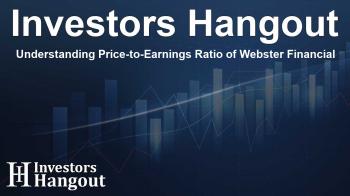Understanding Price-to-Earnings Ratio of Webster Financial

Understanding the Current Marketplace for Webster Financial
In the latest trading session, Webster Financial Inc. (NYSE: WBS) is priced at $58.50, reflecting a modest uptick of 0.50%. Over the past month, the stock has seen positive momentum, gaining approximately 8.32%. Remarkably, this stock has surged by 33.75% over the past year, giving confidence to long-term investors. Yet, many are turning their attention to the critical price-to-earnings (P/E) ratio, which serves as a vital indicator for assessing potential overvaluation.
Decoding the Price-to-Earnings Ratio
The P/E ratio acts as a barometer for assessing the company's market performance against historical earnings, the overall market, and its industry sector. A lower P/E might suggest that investors do not expect significant growth in the company's future earnings, or it could mean the stock is undervalued. Understanding the nuances of the P/E ratio is essential for discerning the intrinsic value of a stock.
Webster Financial in Context
Webster Financial's current P/E ratio is lower than the industry average of 13.88, which raises interesting discussions among analysts and investors. While it may initially imply that the stock could underperform compared to its competitors, it can also signal that investors see potential value in the shares.
Implications for Investors
Though the P/E ratio offers valuable insights into a company's valuation, it is not an all-encompassing metric. While a lower P/E could hint at the stock being undervalued, it may simultaneously indicate a cautious outlook from shareholders regarding future performance. Investors should consider other factors, such as market trends and broader economic indicators, in conjunction with the P/E ratio for sound investment decisions.
Broader Market Considerations
As the financial landscape evolves, many investors are urged to integrate various financial metrics and qualitative analyses when assessing a stock like Webster Financial (NYSE: WBS). It's prudent to remain vigilant of industry shifts, market sentiment, and economic data that could influence stock performance. Reliable investment decisions hinge upon a comprehensive view rather than reliance on any single metric.
Frequently Asked Questions
What does the P/E ratio indicate about a stock?
The P/E ratio indicates how much investors are willing to pay for each dollar of earnings, reflecting growth expectations.
How does Webster Financial's P/E ratio compare to its industry?
Webster Financial's P/E ratio is lower than the industry average, indicating potential undervaluation or less expected growth.
Should an investor solely rely on the P/E ratio for decisions?
No, while the P/E ratio is informative, investors should consider multiple metrics and market factors for comprehensive analysis.
How has Webster Financial's stock performed lately?
The stock has seen significant gains, with an increase of 33.75% in the past year, reassuring to long-term shareholders.
What factors should be reviewed alongside the P/E ratio?
Investors should examine industry trends, market conditions, and other financial metrics for a well-rounded investment strategy.
About The Author
Contact Hannah Lewis privately here. Or send an email with ATTN: Hannah Lewis as the subject to contact@investorshangout.com.
About Investors Hangout
Investors Hangout is a leading online stock forum for financial discussion and learning, offering a wide range of free tools and resources. It draws in traders of all levels, who exchange market knowledge, investigate trading tactics, and keep an eye on industry developments in real time. Featuring financial articles, stock message boards, quotes, charts, company profiles, and live news updates. Through cooperative learning and a wealth of informational resources, it helps users from novices creating their first portfolios to experts honing their techniques. Join Investors Hangout today: https://investorshangout.com/
The content of this article is based on factual, publicly available information and does not represent legal, financial, or investment advice. Investors Hangout does not offer financial advice, and the author is not a licensed financial advisor. Consult a qualified advisor before making any financial or investment decisions based on this article. This article should not be considered advice to purchase, sell, or hold any securities or other investments. If any of the material provided here is inaccurate, please contact us for corrections.

